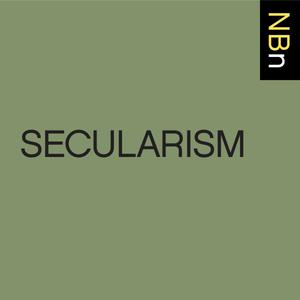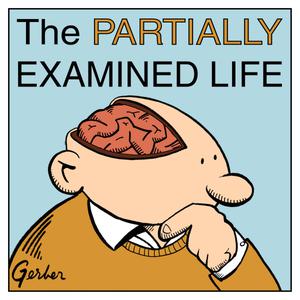
New Books in Secularism
Interviews with Scholars of Secularism about their New Books
- 48 minutes 56 secondsChristopher Cameron, "Black Freethinkers: A History of African American Secularism" (Northwestern UP, 2019)
Black Freethinkers: A History of African American Secularism (Northwestern University Press, 2019) by Christopher Cameron, an Associate Professor of history at the University of North Carolina, Charlotte, is a precise and nuanced history of African American secularism from the early nineteenth century to the mid-twentieth century. This text is written with economy and clarity as defined by four concise chapters that detail the major moments in African American history including some discussion of Reconstruction, the Harlem Renaissance, and the Civil Rights-Black Power era. Traversing nearly two centuries of black thought, from the Antebellum period to the demise of the Black Power era, Black Freethinkers is the first comprehensive historical survey of black free thought. For Cameron, free thought encompasses atheism, agnosticism, deism, paganism and other non-traditional modes of thinking. Cameron’s work focuses primarily on the ideas advanced by African American men and women of letters such as Frederick Douglass, Zora Neale Hurston, Nella Larsen, Lorraine Hansberry, and James Baldwin to support his core argument that freethought and “unbelief” have been key elements of Black thought since the era of enslavement to the institutionalization of free thought oriented associations in African American society.
Cameron’s work forces us to rethink the way we study the era of enslavement and African American culture, and the place of Douglass as an American intellectual central to this history, as well as the role of religion in Black life more generally. In many respects, his text presents a more humanistic portrait of African American thought and culture from a historical perspective that goes well beyond most texts on this subject.
Hettie V. Williams Ph.D., has taught survey courses in U.S. history, Western Civilization, and upper division courses on the history of African Americans at the university level for more than fifteen years. Her teaching and research interests include: African American intellectual history, gender in U.S. history, and race/ethnicity studies. Currently, she is an Assistant Professor of African American history in the Department of History and Anthropology at Monmouth University where she teaches courses in African American history and U.S. history. She has published book chapters, essays, and encyclopedia entries and edited/authored five books. Her latest publications include Bury My Heart in a Free Land: Black Women Intellectuals in Modern U.S. History (Praeger, 2017) and, with Dr. G. Reginald Daniel, professor of historical sociology at the University of California, Santa Barbara, Race and the Obama Phenomenon: The Vision of a More Perfect Multiracial Union (University Press of Mississippi 2014). You can learn more about her work here or follow her on twitter (@DrHettie2017).
Learn more about your ad choices. Visit megaphone.fm/adchoices
Support our show by becoming a premium member! https://newbooksnetwork.supportingcast.fm/secularism
29 April 2024, 8:00 am - 1 hour 7 minutesStephen Bales, "Serapis: The Sacred Library and Its Declericalization" (Library Juice Press, 2021)
The Greco-Egyptian syncretistic god Serapis was used by the 3rd century BCE Ptolemaic pharaohs to impose Greek cultural hegemony and consolidate political power. The Alexandrian Serapeum, sometimes referred to as The Great Library of Alexandria’s “daughter library,” may be seen as an archetype for institutions where religion and secular knowledge come together for the reproduction of ideologies.
The Serapeum, however, is by no means unique in this regard; libraries have always incorporated religious symbols and rituals into their material structures. Very little research has been conducted concerning the sociocultural and historical impact of this union of temple and information institution or how this dynamic interrelationship (even if it may now be implicit or partially concealed) stretches from the earliest Mesopotamian proto-libraries to our present academic ones.
Serapis explores the role of the historical and legacy religious symbols and rituals of the academic library (referred to as the “Serapian Library”) as a powerful ideological state institution and investigates how these symbols and rituals support hegemonic structures in society. Specifically, the book examines the role of the modern secular “Serapian” academic library in its historical context as a “sacred space,” and applies the theories of Karl Marx, Louis Althusser, Ivan Illich, and other thinkers to explain the ramifications of the library as crypto-temple.
Jen Hoyer is Technical Services and Electronic Resources Librarian at CUNY New York City College of Technology. Jen edits for Partnership Journal and organizes with the TPS Collective. She is co-author of What Primary Sources Teach: Lessons for Every Classroom and The Social Movement Archive.
Learn more about your ad choices. Visit megaphone.fm/adchoices
Support our show by becoming a premium member! https://newbooksnetwork.supportingcast.fm/secularism
12 October 2023, 8:00 am - 43 minutes 6 secondsRik Peels, "Life without God: An Outsider's Look at Atheism" (Cambridge UP, 2023)
In Life without God: An Outsider's Look at Atheism (Cambridge UP, 2023), Rik Peels explores atheism from a new perspective that aims to go beyond the highly polarized debate about arguments for and against God's existence. Since our beliefs about the most important things in life are not usually based on arguments, we should look beyond atheistic arguments and explore what truly motivates the atheist. Are there certain ideals or experiences that explain the turn to atheism? Could atheism be the default position for us, not requiring any arguments whatsoever? And what about the often-discussed arguments against belief in God-is there something that religious and nonreligious people alike can learn from them? This book explores how a novel understanding of atheism is possible - and how it effectively moves the God debate further. Believers and nonbelievers can learn much from Peels's assessment of arguments for and against atheism.
Tiatemsu Longkumer is a faculty in the Department of Anthropology at Royal Thimphu College, Bhutan. His academic pursuits center on the fields of Anthropology and the Philosophy of Religion.
Learn more about your ad choices. Visit megaphone.fm/adchoices
Support our show by becoming a premium member! https://newbooksnetwork.supportingcast.fm/secularism
2 October 2023, 8:00 am - 34 minutes 29 secondsA Better Way to Buy Books
Bookshop.org is an online book retailer that donates more than 80% of its profits to independent bookstores. Launched in 2020, Bookshop.org has already raised more than $27,000,000. In this interview, Andy Hunter, founder and CEO discusses his journey to creating one of the most revolutionary new organizations in the book world. Bookshop has found a way to retain the convenience of online book shopping while also supporting independent bookstores that are the backbones of many local communities.
Andy Hunter is CEO and Founder of Bookshop.org. He also co-created Literary Hub.
Caleb Zakarin is the Assistant Editor of the New Books Network.
Learn more about your ad choices. Visit megaphone.fm/adchoices
Support our show by becoming a premium member! https://newbooksnetwork.supportingcast.fm/secularism
12 September 2023, 8:00 am - 35 minutes 41 secondsThe Future of Secularization: A Discussion with Ryan Cragun
The statement ‘we live in a secular age’ is open to the obvious challenge that in some parts of the word, religion is a growing force in society. And even in places such as the US, religious activists seem to have growing influence – as the recent US Supreme Court decision about abortion suggests. So, is this actually a secular age? Ryan Cragun is a co-author (with Isabella Kasselstrand and Phil Zuckerman) of Beyond Doubt: The Secularization of Society (NYU Press, 2023) – listen to him in conversation with Owen Bennett Jones.
Owen Bennett-Jones is a freelance journalist and writer. A former BBC correspondent and presenter he has been a resident foreign correspondent in Bucharest, Geneva, Islamabad, Hanoi and Beirut. He is recently wrote a history of the Bhutto dynasty which was published by Yale University Press.
Learn more about your ad choices. Visit megaphone.fm/adchoices
Support our show by becoming a premium member! https://newbooksnetwork.supportingcast.fm/secularism
11 September 2023, 8:00 am - 41 minutes 8 secondsSharada Sugirtharajah, "Religious and Non-Religious Perspectives on Happiness and Wellbeing" (Routledge, 2022)
Sharada Sugirtharajah's edited volume Religious and Non-Religious Perspectives on Happiness and Wellbeing (Routledge, 2022) explores the theme of happiness and well-being from religious, spiritual, philosophical, psychological, humanistic, and health perspectives. Taking a non-binary approach, it considers how happiness in particular has been understood and appropriated in religious and non-religious strands of thought. The chapters offer incisive insight from a variety of perspectives, including humanism, atheism and major religions such as Christianity, Islam, Buddhism, Hinduism, and Judaism. Together they demonstrate that although worldviews might vary substantially, there are concurrences across religious and non-religious perspectives on happiness that provide a common ground for further cross-cultural and interreligious exploration. What the book makes clear is that happiness is not a static or monolithic category. It is an ongoing process of being and becoming, striving and seeking, living ethically and meaningfully, as well as arriving at a tranquil state of being. This multifaceted volume makes a fresh contribution to the contemporary study of happiness and is valuable reading for scholars and students from religious studies and theology, including those interested in interreligious dialogue and the psychology of religion, as well as positive psychology.
Raj Balkaran is a scholar of Sanskrit narrative texts. He teaches at the Oxford Centre for Hindu Studies and at his own virtual School of Indian Wisdom. For information see rajbalkaran.com.
Learn more about your ad choices. Visit megaphone.fm/adchoices
Support our show by becoming a premium member! https://newbooksnetwork.supportingcast.fm/secularism
17 August 2023, 8:00 am - 29 minutes 20 secondsRenny Thomas, "Science and Religion in India: Beyond Disenchantment" (Routledge, 2022)
Science and Religion in India: Beyond Disenchantment (Routledge, 2022) provides an in-depth ethnographic study of science and religion in the context of South Asia, giving voice to Indian scientists and shedding valuable light on their engagement with religion. Drawing on biographical, autobiographical, historical, and ethnographic material, the volume focuses on scientists' religious life and practices, and the variety of ways in which they express them. Renny Thomas challenges the idea that science and religion in India are naturally connected and argues that the discussion has to go beyond binary models of 'conflict' and 'complementarity'. By complicating the understanding of science and religion in India, the book engages with new ways of looking at these categories.
Raj Balkaran is a scholar of Sanskrit narrative texts. He teaches at the Oxford Centre for Hindu Studies and at his own virtual School of Indian Wisdom. For information see rajbalkaran.com.
Learn more about your ad choices. Visit megaphone.fm/adchoices
Support our show by becoming a premium member! https://newbooksnetwork.supportingcast.fm/secularism
10 August 2023, 8:00 am - 39 minutes 50 secondsMichael Muhammad Knight, "Sufi Deleuze: Secretions of Islamic Atheism" (Fordham UP, 2023)
“There is always an atheism to be extracted from a religion,” Deleuze and Guattari write in their final collaboration, What Is Philosophy? Their claim that Christianity “secretes” atheism “more than any other religion,” however, reflects the limits of their archive. Theological projects seeking to engage Deleuze remain embedded within Christian theologies and intellectual histories; whether they embrace, resist, or negotiate with Deleuze’s atheism, the atheism in question remains one extracted from Christian theology, a Christian atheism. In Sufi Deleuze, Michael Muhammad Knight offers an intervention, engaging Deleuzian questions and themes from within Islamic tradition.
Even if Deleuze did not think of himself as a theologian, Knight argues, to place Deleuze in conversation with Islam is a project of comparative theology and faces the challenge of any comparative theology: It seemingly demands that complex, internally diverse traditions can speak as coherent, monolithic wholes. To start from such a place would not only defy Islam’s historical multiplicity but also betray Deleuze’s model of the assemblage, which requires attention to not only the organizing and stabilizing tendencies within a structure but also the points at which a structure resists organization, its internal heterogeneity, and unpredictable “lines of flight.”
A Deleuzian approach to Islamic theology would first have to affirm that there is no such thing as a universal “Islamic theology” that can speak for all Muslims in all historical settings, but rather a multiplicity of power struggles between major and minor forces that contest each other over authenticity, authority, and the making of “orthodoxy.” The discussions in Sufi Deleuze: Secretions of Islamic Atheism (Fordham UP, 2023) thus highlight Islam’s extraordinary range of possibilities, not only making use of canonically privileged materials such as the Qur’an and major hadith collections, but also exploring a variety of marginalized resources found throughout Islam that challenge the notion of a singular “mainstream” interpretive tradition. To say it in Deleuze’s vocabulary, Islam is a rhizome.
Adam Bobeck is a PhD candidate in Cultural Anthropology at the University of Leipzig. His PhD is entitled “Object-Oriented Azadari: Ontology and Ritual Theory”.
Learn more about your ad choices. Visit megaphone.fm/adchoices
Support our show by becoming a premium member! https://newbooksnetwork.supportingcast.fm/secularism
28 June 2023, 8:00 am - 1 hour 22 minutesAnna Della Subin, "Accidental Gods: On Race, Empire, and Men Unwittingly Turned Divine" (Metropolitan Books, 2021)
Ever since 1492, when Christopher Columbus made landfall in the New World and was hailed as a heavenly being, the accidental god has haunted the modern age. From Haile Selassie, acclaimed as the Living God in Jamaica, to Britain's Prince Philip, who became the unlikely center of a new religion on a South Pacific island, men made divine—nearly always men—have appeared on every continent. And because these deifications always emerge at moments of turbulence—civil wars, imperial conquest, revolutions—they have much to teach us.
In Accidental Gods: On Race, Empire, and Men Unwittingly Turned Divine (Metropolitan Books, 2021), Anna Della Subin presents a revelatory history spanning five centuries of a cast of surprising deities that help to shed light on the thorny questions of how our modern concept of "religion" was invented, why religion and politics are perpetually entangled in our supposedly secular age, and how the power to call someone divine has been used and abused by both oppressors and the oppressed. From nationalist uprisings in India to Nigerian spirit possession cults, Subin explores how deification has been a means of defiance for colonized peoples. Conversely, we see how Columbus, Cortés, and other white explorers amplified stories of their godhood to justify their dominion over native peoples, setting into motion the currents of racism and exclusion that have plagued the New World ever since they touched its shores.
Anna Della Subin is a writer, critic, senior editor at Bidoun, the award-winning publishing and curatorial initiative focused on the Middle East and its diasporas, and a contributing editor at The Public Domain Review. Her work has appeared in many prestigious publications such as the London Review of Books, Harper’s, The New York Review of Books, The New York Times, The New Yorker, and more. Anna Della was named one of the world’s top 50 thinkers for 2022 by Prospect Magazine. She studied philosophy and classics at the University of Chicago and the history of religion at Harvard Divinity School.
Carrie Lynn Evans is a PhD student at Université Laval in Quebec City. [email protected] @carrielynnland
Learn more about your ad choices. Visit megaphone.fm/adchoices
Support our show by becoming a premium member! https://newbooksnetwork.supportingcast.fm/secularism
23 June 2023, 4:00 am - 30 minutes 28 secondsJ. Barton Scott, "Slandering the Sacred: Blasphemy Law and Religious Affect in Colonial India" (U Chicago Press, 2023)
Why is religion today so often associated with giving and taking offense? To answer this question, Slandering the Sacred: Blasphemy Law and Religious Affect in Colonial India (U Chicago Press, 2023) invites us to consider how colonial infrastructures shaped our globalized world. Through the origin and afterlives of a 1927 British imperial law (Section 295A of the Indian Penal Code), J. Barton Scott weaves a globe-trotting narrative about secularism, empire, insult, and outrage. Decentering white martyrs to free thought, his story calls for new histories of blasphemy that return these thinkers to their imperial context, dismantle the cultural boundaries of the West, and transgress the borders between the secular and the sacred as well as the public and the private.
Raj Balkaran is a scholar of Sanskrit narrative texts. He teaches at the Oxford Centre for Hindu Studies and at his own virtual School of Indian Wisdom. For information see rajbalkaran.com.
Learn more about your ad choices. Visit megaphone.fm/adchoices
Support our show by becoming a premium member! https://newbooksnetwork.supportingcast.fm/secularism
22 June 2023, 8:00 am - 1 hour 12 minutesSocialist Cultures and Politics of Secularism and Atheism
Two new books on secularism and atheism in German and Soviet socialist cultures are reshaping scholarly understandings of the relationship between socialism and religion. Todd Weir and Victoria Smolkin show that socialist secularism and atheism were not concerned solely with destroying a tool of class oppression, as Marx had envisioned, but with creating a positive faith in science and materialism. Todd Weir is Professor on the Faculty of Theology and Religious Studies at the University of Groningen and the author of the forthcoming Socialism and Secularist Culture in Germany, 1800-1933. Victoria Smolkin is Associate Professor in the Department of History at Wesleyan University and the author of A Sacred Space Is Never Empty: A History of Soviet Atheism (Princeton University Press, 2018).
Stephen V. Bittner is Special Topics Editor at Kritika: Explorations in Russian and Eurasian History and Professor of History at Sonoma State University.
Learn more about your ad choices. Visit megaphone.fm/adchoices
Support our show by becoming a premium member! https://newbooksnetwork.supportingcast.fm/secularism
13 June 2023, 8:00 am - More Episodes? Get the App
Your feedback is valuable to us. Should you encounter any bugs, glitches, lack of functionality or other problems, please email us on [email protected] or join Moon.FM Telegram Group where you can talk directly to the dev team who are happy to answer any queries.
 The Atheist Experience
The Atheist Experience
 Straight White American Jesus
Straight White American Jesus
 SUBTEXT Literature and Film Podcast
SUBTEXT Literature and Film Podcast
 The Partially Examined Life Philosophy Podcast
The Partially Examined Life Philosophy Podcast
 Geek's Guide to the Galaxy - A Science Fiction Podcast
Geek's Guide to the Galaxy - A Science Fiction Podcast
 Jacobin Radio
Jacobin Radio